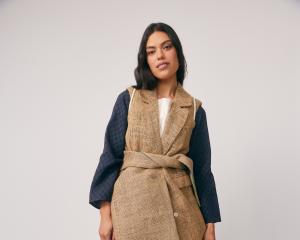
The revolutionary product was the brainchild of Kāpiti man Greg Howard who started the company in lockdown last year after years of planning and research into creating a footwear company that would fight to reduce the amount of pollution caused by 20 billion shoes that go into landfill each year.
The result is a 94 per cent plant-based, bespoke, durable shoe with a bio-rubber sole made of natural rubber, rice husk ash, coconut oil, and insoles of cork, coconut husk and natural rubber.
The formula is not only a global first combining aesthetics, technical excellence, and ethics, but is also designed to eliminate the number of disposed shoes entering landfills.
Orba's first fulltime employee, sustainability manager Gillian Boucher, said the ethos of the company was about closing the loop in product production.
"The basic principle of the shoe is that we wanted to design a biodegradable shoe right down to the finest of details.
"Take for example the eyelet, most shoes would have metal or plastic eyelets so we had to find a way to create them without these materials.
"We decided to try embroidering them which is something the footwear assembly manufacturer had never done before - so there were lots of firsts during the production process."

While available to only the New Zealand market, production is done in Indonesia, which has one of the largest footwear manufacturing industries in the world.
Part of their sustainable ethos has included creating social development initiatives to help their local weavers and partners in Indonesia.
"We believe in social equity and fair treatment across our global community, so our standards include no discrimination, fair remuneration and decent work hours as just a few of the benefits for our people."
Using materials such as the husk from the outside of rice that is a waste product from food production in Indonesia, Orba buys it and turns it into a biosilica.
"This gives the local farmers extra income because we are buying what they would normally just throw out."
While the shoes are built with natural products and built to biodegrade, Gillian said this does not compromise the design or quality of Orba shoes.
"If you put a cotton T-shirt on it won't biodegrade while you're walking around town, but if you put it in a nutrient-rich environment it won't be there for long.
"This is the same science."
The shoes are built to a high standard, competitive with normal shoes and have been through all the relevant ISO standard testing.
"They meet international standards for abrasion, slip resistance, flexibility and tear strength.
"They are durable, super comfortable, smart and diverse."
Currently producing only the Ghost Sneaker, a stylish off-white, there is potential to produce other colours and models using the same natural products.
"We're working with our local weaver and local dyers in Indonesia and they've got a whole bunch of beautiful plant-based dyes for future colours.
"We just want the shoe to be in the market for a little while to see what our customers might want before adding more options.
"Anything can be made from these materials."
To complete the cycle of consumption, Orba wants you to send the shoes back to them when you're finished with them.
"They will biodegrade in a really specific environment so we want people to send them back to us so we can dispose of them in the right environment."
Gillian said closing the loop of production is an emerging trend she thinks we will be seeing more of soon.
"I think we are going to see companies working together to work on collection systems with infrastructure for industrial compostability and biodegradability facilities.
"Right now you can have a lot of things that are biodegradable, but it has to be in the right conditions.
"We need to ramp up infrastructure, working together to deal with these products.
"We want eco-friendly products, but the industry has to start looking at ways to deal with them in the end."
Gillian said being part of a business that is staying firm to its sustainability goals from the start is exciting.
"The ethos behind the shoe is groundbreaking and exciting.
"It's been challenging replacing all parts of a shoe with natural alternatives while making it better and cost-effective at the same time.
"We've been really strict with staying firm to our commitment.
"You feel proud when you keep true to your goals."












